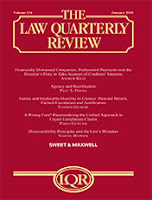Kelvin Kwok
Law Quarterly Review
2021, Vol 134, p 193
Abstract: Does a land-related restrictive covenant fall within the restraint of trade (RoT) doctrine such that the restrictions under the covenant must be justified as reasonable? This important question, which impacts upon a wide variety of land-related transactions, had long been answered according to the “pre-existing freedom” test prescribed by Lord Reid in the English House of Lords decision in Esso Petroleum Co Ltd v Harper’s Garage (Stourport) Ltd (1968). The question regarding the applicability of the RoT doctrine to land-related restrictive covenants came before the English Supreme Court most recently in Peninsula Securities Ltd v Dunnes Stores (Bangor) Ltd (2020). The Supreme Court took the monumental step of abolishing the long-established “pre-existing freedom” test, and preferred an alternative approach based on Lord Wilberforce’s “trading society” test in Esso. The purpose of this article is to critically examine the conflicting approaches under the "pre-existing freedom" and "trading society" tests. The article argues that neither of these tests constitutes the proper approach to the assessment of land-related restrictive covenants under the RoT doctrine. The test of applicability should instead consist of the simple question of whether the covenant restricts a person’s liberty to trade, a broad approach advocated by J.D. Heydon many years ago. This all-encompassing approach would represent a major policy improvement in the common law, albeit purchased at the expense of legal certainty.

No comments:
Post a Comment